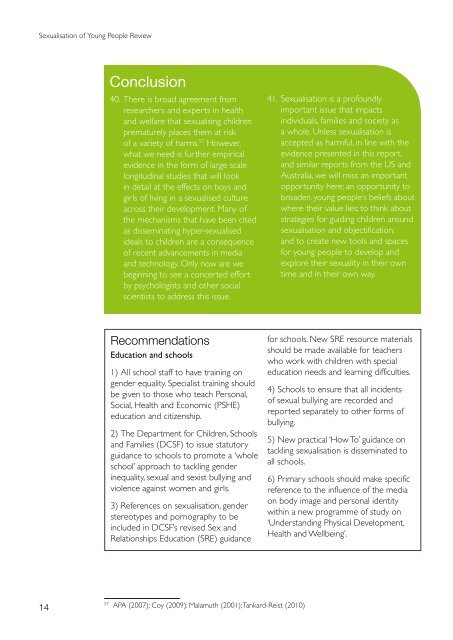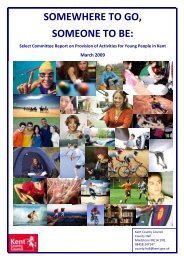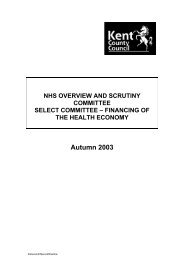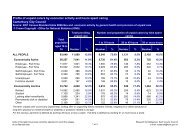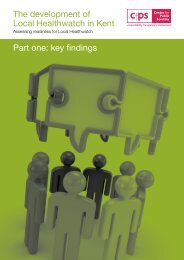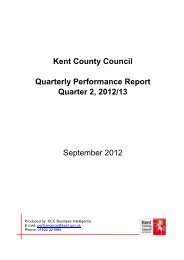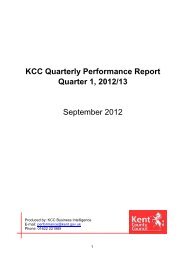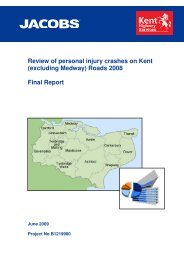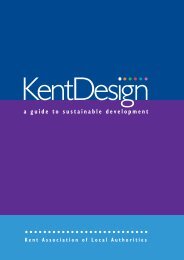Sexualisation of Young People Review
Sexualisation of Young People Review
Sexualisation of Young People Review
Create successful ePaper yourself
Turn your PDF publications into a flip-book with our unique Google optimized e-Paper software.
<strong>Sexualisation</strong> <strong>of</strong> <strong>Young</strong> <strong>People</strong> <strong>Review</strong><br />
Conclusion<br />
40. There is broad agreement from<br />
researchers and experts in health<br />
and welfare that sexualising children<br />
prematurely places them at risk<br />
<strong>of</strong> a variety <strong>of</strong> harms. 57 However,<br />
what we need is further empirical<br />
evidence in the form <strong>of</strong> large scale<br />
longitudinal studies that will look<br />
in detail at the effects on boys and<br />
girls <strong>of</strong> living in a sexualised culture<br />
across their development. Many <strong>of</strong><br />
the mechanisms that have been cited<br />
as disseminating hyper-sexualised<br />
ideals to children are a consequence<br />
<strong>of</strong> recent advancements in media<br />
and technology. Only now are we<br />
beginning to see a concerted effort<br />
by psychologists and other social<br />
scientists to address this issue.<br />
41. <strong>Sexualisation</strong> is a pr<strong>of</strong>oundly<br />
important issue that impacts<br />
individuals, families and society as<br />
a whole. Unless sexualisation is<br />
accepted as harmful, in line with the<br />
evidence presented in this report,<br />
and similar reports from the US and<br />
Australia, we will miss an important<br />
opportunity here: an opportunity to<br />
broaden young people’s beliefs about<br />
where their value lies; to think about<br />
strategies for guiding children around<br />
sexualisation and objectification;<br />
and to create new tools and spaces<br />
for young people to develop and<br />
explore their sexuality in their own<br />
time and in their own way.<br />
Recommendations<br />
Education and schools<br />
1) All school staff to have training on<br />
gender equality. Specialist training should<br />
be given to those who teach Personal,<br />
Social, Health and Economic (PSHE)<br />
education and citizenship.<br />
2) The Department for Children, Schools<br />
and Families (DCSF) to issue statutory<br />
guidance to schools to promote a ‘whole<br />
school’ approach to tackling gender<br />
inequality, sexual and sexist bullying and<br />
violence against women and girls.<br />
3) References on sexualisation, gender<br />
stereotypes and pornography to be<br />
included in DCSF’s revised Sex and<br />
Relationships Education (SRE) guidance<br />
for schools. New SRE resource materials<br />
should be made available for teachers<br />
who work with children with special<br />
education needs and learning difficulties.<br />
4) Schools to ensure that all incidents<br />
<strong>of</strong> sexual bullying are recorded and<br />
reported separately to other forms <strong>of</strong><br />
bullying.<br />
5) New practical ‘How To’ guidance on<br />
tackling sexualisation is disseminated to<br />
all schools.<br />
6) Primary schools should make specific<br />
reference to the influence <strong>of</strong> the media<br />
on body image and personal identity<br />
within a new programme <strong>of</strong> study on<br />
‘Understanding Physical Development,<br />
Health and Wellbeing’.<br />
57<br />
14<br />
57<br />
APA (2007); Coy (2009); Malamuth (2001); Tankard-Reist (2010)


